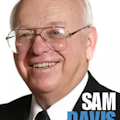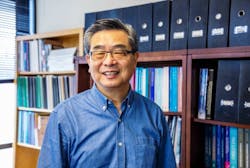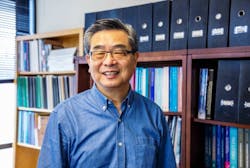Dr. Fred Lee, an old friend of Power Electronics Technology, and before that PCIM, has decided to turn in his slide rule, or computer, and retire. Dr. Lee published several papers in PCIM conferences and articles in PCIM magazine. He was the driving force for important power electronics technology developments in the early years of this industry and up to the present day.
An announcement from Virginia Tech said Lee, a University Distinguished Professor in the Bradley Department of Electrical and Computer Engineering and founder and director of the internationally known Center for Power Electronics Systems (CPES), will retire from Virginia Tech in September 2017.
After 40 years at the university, Lee, who is also a member of the U.S. National Academy of Engineering, has made immeasurable contributions to the field of power electronics. These include:
- Earning more than $100 million in research funding
- Supervising 84 Ph.D. students and 93 master’s students to completion
- Filing 104 patents (82 of which so far have been awarded, with the rest pending)
- Becoming one of the top three most-cited engineering authors out of over 1 million, according to the Microsoft H index
- Publishing more than 290 journal papers and 710 referred conference papers.
Yet, from the beginning, Lee’s immense career in power electronics was serendipitous.
After completing a bachelor’s degree in electrical engineering from the National Cheng Kung University in Taiwan, Lee came to the United States in 1969 and enrolled in a master’s program at the University of Missouri. His fiancee, Leei Wong, was studying at University of North Carolina at Chapel Hill—918 miles away. Lee closed the distance by transferring to Duke University, where he suddenly needed to find funding.
Dr. Fred Lee, who is also a member of the U.S. National Academy of Engineering, has made immeasurable contributions to the field of power electronics.
That’s when Lee met Tom Wilson, a professor in Duke’s Department of Electrical Engineering, who would change the trajectory of Lee’s career.
“This professor ... has money. And he is also the most well-known in the department,” Lee said of his thoughts at the time. “So I got the money, and I got the famous professor. Why not? Whatever he does, I am willing to learn.
“That's how I got into power electronics,” Lee said, laughing. “In my generation, almost everyone got into power electronics by surprise, by accident.”
Lee explained that, at the time, no one could have predicted the importance of power electronics. But the rise of the aerospace industry—coupled with the rebuilding of Japan following World War II and the adoption of electrified mass transportation in Europe—thrust the field into the international spotlight.
Today, nearly everything used by consumers is in some way touched by power electronics: cell phones, laptops, and electric vehicles, to name a few. Lee witnessed this evolution and was actively part of it.
“I lived through it,” he said. “When I teach a class, I am basically teaching my life.”
Long before he would set foot in the classroom, Lee worked in industry. After earning his master’s degree in 1972 and his Ph.D. in 1974 from Duke, he ventured out west to California to work at aerospace- and automotive-focused corporation TRW Inc. After three years, Lee was tired of a two-hour commute to and from Los Angeles, where “there is no winter.”
“I really missed the four seasons,” Lee said. “After three years, I decided I had to move somewhere on the East Coast, to a small town, not a big city. Since I knew what industry life was like I said, ‘Maybe I should try academia. I don’t know what it is. Let's give it a try.’”
Much to the confusion of interviewers at several universities, Lee took a significant salary cut and went into academia—once telling an interviewer that they could pay him “whatever.”
In 1977, Lee was hired as an assistant professor of electrical engineering at Virginia Tech. Three years later, he became an associate professor, then a professor three years after that.
In 1983, he founded and became the director of the Virginia Power Electronics Center, a precursor to the 1998 founding of CPES. Lee was also honored in 1998 by Virginia Tech with the University Distinguished Professor distinction.
“Not only is Fred a giant of the power electronics field, he is a visionary professor who has left his mark on this university in a major way,” said G. Don Taylor, Charles O. Gordon Professor of Industrial and Systems Engineering and interim dean of the College of Engineering at Virginia Tech.
Lee established Virginia Tech as the destination for leading researchers and educators in power electronic systems worldwide. His successful industry affiliates program has been replicated by many other groups across the university.
Lee’s work with CPES was one of the defining elements of his career. The industry consortium became a model Engineering Research Center (ERC), as designated by the National Science Foundation.
“Fred delivered on his bold and ambitious vision to create a center where researchers from Virginia Tech and partner institutions could collaborate hand-in-hand with industry affiliates to radically transform electronic systems-level technologies that are used to power everything from microprocessors to electric vehicles to cities,” said Theresa Mayer, vice president for research and innovation at Virginia Tech.
During the 10-year NSF ERC program, CPES teamed up with 96 industry partners and five universities, with Virginia Tech as the lead institution.
“His inspirational leadership of CPES for over 30 years has made Virginia Tech the global destination for top researchers and educators in power electronic systems and their applications,” Mayer said.
In this 10-year period, the center has received $30.4 million in funding from the NSF and $57 million in funding from industry, government, and institutional support; graduated 153 Ph.D. and 176 master’s students; published more than 3,100 technical papers, theses, and dissertations; filed 286 invention disclosures; and was awarded 103 patents.
CPES, a center that once took up a single room in Patton Hall, now spans the entire first floor of Whittemore Hall, with more than 50 graduate students working on projects for industry partners.
Yet, it’s not the center’s growth that inspires Lee the most. It’s the growth he sees in his students.
He beams when he tells the stories of his students’ successes, both in industry and academia. Former students regularly visit or write to Lee, telling him anecdotes of his influence that even Lee doesn’t remember. Often, students will come back to form partnerships between their companies and CPES.
“They listened to me before, now I listen to them,” Lee said.
Perhaps the closest of such relationships is that with Dushan Boroyevich, University Distinguished Professor and American Electric Power Professor in the Bradley Department of Electrical and Computer Engineering. After graduating with a doctorate earned under Lee's guidance in 1985, Boroyevich returned to University Novi Sad in Yugoslavia to become a professor and later the department head.
Lee personally recruited Boroyevich—as he does with most of his students — by traveling to Yugoslavia in 1990 to convince him to return to Virginia Tech.
For more than three decades since, the pair have been “side-by-side,” Lee said.
“Fred is forever challenging us to understand. All of his students and co-workers recall months of trying to explain to Dr. Lee their new ideas and constantly being challenged, even about basic assumptions and concepts,” Boroyevich said. “Finally, in frustration, you are not sure if you are completely incapable of understanding anything … until you accidentally overhear Fred telling someone else, ‘This is the best idea I’ve seen in a long time. You should use it!’”
Lee hopes he made one thing clear to all of his students over the years: “I'm trying to drive hard to their mind that you have to discover your limit,” Lee said. “And my message basically to them is: There is no limit. You have to push yourself, then you begin to realize what you consider impossible is actually possible.”
Lee credits Wilson, his professor at Duke, with teaching him this attitude, which Lee said was the single most important lesson of his career. In his retirement, he hopes to continue passing this mentality down to students through his mentorship of junior faculty members in his department.
Rather than have his own students or take on the role of principal investigator for grants, Lee, as a part-time professor, “will give every opportunity to junior faculty members,” he said.
Lee will have some down time in retirement, too. He plans to do more fishing and golfing and wants to travel and visit some of the dozen universities across the globe where he has served as an honorary professor.
As for where he plans to retire, Lee won’t be giving up his four seasons anytime soon.
“I've been looking for a place to retire for the last 10 years,” he said. “I gave up. Blacksburg is the best.”
About the Author

Sam Davis
Sam Davis was the editor-in-chief of Power Electronics Technology magazine and website that is now part of Electronic Design. He has 18 years experience in electronic engineering design and management, six years in public relations and 25 years as a trade press editor. He holds a BSEE from Case-Western Reserve University, and did graduate work at the same school and UCLA. Sam was the editor for PCIM, the predecessor to Power Electronics Technology, from 1984 to 2004. His engineering experience includes circuit and system design for Litton Systems, Bunker-Ramo, Rocketdyne, and Clevite Corporation.. Design tasks included analog circuits, display systems, power supplies, underwater ordnance systems, and test systems. He also served as a program manager for a Litton Systems Navy program.
Sam is the author of Computer Data Displays, a book published by Prentice-Hall in the U.S. and Japan in 1969. He is also a recipient of the Jesse Neal Award for trade press editorial excellence, and has one patent for naval ship construction that simplifies electronic system integration.
You can also check out his Power Electronics blog.

